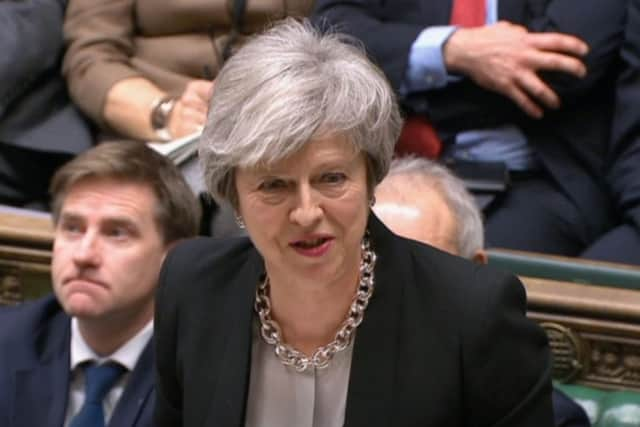Brexit: PM wins reprieve but risks no deal with call for renegotiation
After pleading for a mandate from Parliament to confront Brussels over the controversial Irish border “backstop”, the UK government won over Conservative Brexiteers and secured a crucial Commons victory by 317 votes to 301.
The EU immediately ruled out any renegotiation, deepening the deadlock with two months until the UK is set to leave the EU.
Advertisement
Hide AdAdvertisement
Hide Ad“There is a route that can secure a substantial and sustainable majority in this House for leaving the EU with a deal,” the Prime Minister told MPs following last night’s result.


MPs also passed a non-binding amendment ruling out a no-deal Brexit, but Mrs May warned the Commons that “simply opposing no-deal is not enough to stop it” and called for it to back the proposed agreement.
A Labour bid to delay Brexit and seize control of parliamentary business to block a no-deal outcome was defeated, with a handful of rebel Labour MPs tipping the balance.
Nicola Sturgeon said the votes were “a woeful abdication of responsibility”.
“The House of Commons could have asserted itself tonight – instead it indulged the Prime Minister’s decision to chase a fairy tale,” the First Minister tweeted.
Liberal Democrat MP Tom Brake said Labour MPs who backed the government were the “handmaids to a Tory Brexit”.
“As a result, a no-deal Brexit is a step closer,” Mr Brake said. “People will be worried about what the future holds.”
Just two weeks ago, Mrs May herself warned it was impossible to remove the Irish border insurance policy from the Brexit deal, shortly before suffering a crushing 230-vote defeat.
Advertisement
Hide AdAdvertisement
Hide AdSeeking a Commons majority to reverse that humiliation, the government backed an amendment from the chairman of the Tory 1922 Committee, Sir Graham Brady.
It called for the insurance policy to prevent a hard border in Ireland – which would impose EU regulations on the UK if no trade deal is agreed with Brussels by the end of 2020 – to be replaced with “alternative arrangements” such as automated customs technology.
The Prime Minister told MPs that reopening the withdrawal agreement was the only chance to cut through the uncertainty around Brexit.
Pleading for support from Parliament before a series of votes on backbench and opposition proposals for “Plan B”, Mrs May said: “Do that and I can work to open the withdrawal agreement. Do that and I can fight for a backstop that honours our commitment to the people of Northern Ireland in a way this House can support.”
Adding that “the time has come for words to be matched with deeds”, she said: “If you want to leave with a deal, you have to vote for it.
“If you want Brexit, you have to vote for Brexit.”
Earlier, the Prime Minister told Cabinet she was ready to reopen the withdrawal agreement to seek legally-binding changes to the backstop.
“What I’m talking about is not a further exchange of letters, but a significant and legally binding change to the withdrawal agreement,” she told MPs.
“Negotiating such a change will not be easy – it will involve re-opening the withdrawal agreement – a move for which I know there is limited appetite among our European partners.”
Advertisement
Hide AdAdvertisement
Hide AdShe won crucial support from DUP Westminster leader Nigel Dodds, who backed Mrs May’s bid to seek a renegotiation that “avoids any hard border on the island of Ireland, but also avoids any borders within the UK”.
But there was a warning from the independent Unionist MP for North Down, Lady Hermon, who called the Prime Minister’s backstop plans “nebulous” and said she had a “duty to spell out” what the alternative arrangements are.
The amendment was also backed by opposing wings of the Conservative Party, with the chairman of the Brexiteer European Research Group of Tory MPs, Jacob Rees-Mogg, joining pro-EU former minister Nicky Morgan to support the Prime Minister.
The unlikely pair are key figures behind a proposal that emerged overnight on Monday in a bid to unify the Conservative Party. Dubbed the “Malthouse Compromise” after Kit Malthouse, the minister who brought the parties together, the plan would extend the transition period from the end of 2020 and into December 2021 as part of an attempt to remove the need for the backstop.
However, critics dismissed a suggestion the UK could take part in a “standstill transition” even after crashing out of the EU without a deal.
Mrs May committed to “engage seriously and positively with the proposals”. She added: “While there are obviously details that need to be worked through, the fact that leading figures from different sides of the argument are coming together to develop proposals shows how much progress has been made over the past few weeks.”
The Green MP Caroline Lucas accused the Prime Minister of chasing “heated up fantasies that have already been rejected by the EU”.
The Prime Minister’s official spokesman said Mrs May aims to return to the Commons “as soon as possible” with a revised deal, which will be subject to a fresh “meaningful vote” by MPs.
Advertisement
Hide AdAdvertisement
Hide AdIf this is rejected by MPs, she will table a further amendable motion for debate the next day. If no new deal has been reached with the EU by 13 February, Mrs May will make a statement to the House and table an amendable motion for debate the following day.